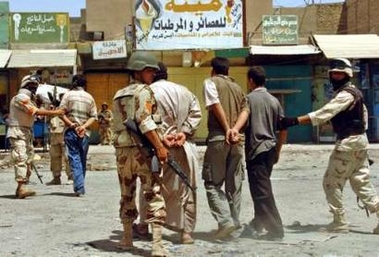
Today's UK Guardian reports the story of an Iraqi Kurdish Muslim practicing his religion against great odds. Ali Bapir, a militia leader who opposed Saddam Hussein, was arrested in 2003 on the way to ask for compensation for a US missile strike that had killed 43 of his followers. His US captors claimed he had planned attacks on them, conspired with Iran, and was in league with terrorists. The Guardian reports:
. . . He said he was tortured but refused to go into details. "I don't want to explain. That's all. I will only tell you the consequences of the torture. When I went to prison my weight was 75kg (165lbs) but after nine days I had lost 15kg and my heartbeat was very quick. I told everything to the Red Cross."
For twenty-two months the US held him alongside captured Ba'athists including Ali Hassan al-Majid, aka Chemical Ali, the alleged mastermind of gas attacks on the Kurds and of the brutal suppression of the Shia and Tariq Aziz, Saddam Hussein's former deputy prime minister. The former dictator himself was in a nearby building. Bapir protested:
"Why did you put me in here with criminals and mass murderers? I have never been a Ba'athist and I am not a terrorist. I even killed my brother because he spied for the Iraqi intelligence."
But as the weeks progressed, he channeled his rage into pity and became a spiritual guide to the ex-Ba'athist leaders, teaching them the Qur'an and leading them in prayer.
"At first I was hostile to them," he said. "What they did to my people and the Iraqi people in general was not to be forgiven. But they were also in prison and in a weak position. It was my duty under Islam to show mercy, even to these people who had never shown mercy to others."
. . .
His sermons and counseling had an effect. "Some of them did recognize their mistakes. Some of them told me they would go to their cells and open the Qur'an and cry because now they made sense of what they did and how horrifying were the results of their actions."
Finally the US occupiers let him go, without explanation. Amazingly, the experience has confirmed his religious opposition to terrorist war:
Now Sheikh Ali hopes to convince Islamists to renounce violence. He regards the suicide bombers in Iraq as being foreigners who are "ignorant" of Iraq and Islam. "The Qur'an says it is wrong for even one innocent Muslim to be killed among 100 guilty people," he said. "Killing an innocent policeman or other people who are just job seekers is not Islamic."
Do I believe this is a true story of spiritual maturity or is it just a charming fable, concocted out of the converging interests of a minor Kurdish warlord and an antiwar British newspaper? It could be the latter, but I am willing to believe it. Some fraction of us, on some happy occasions, do transform our adversities into the strength to temper justice with compassion. Such transformations, our own and others, are the stuff of hope.
No comments:
Post a Comment